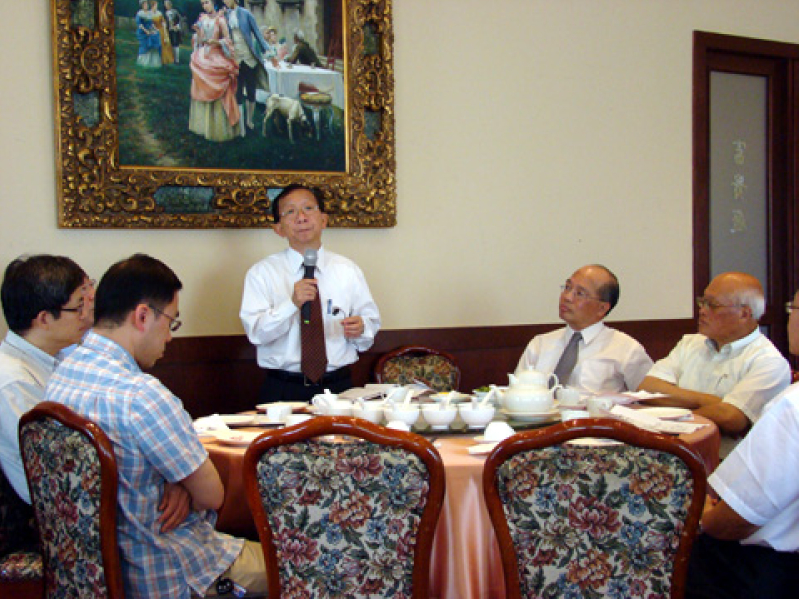
VANCOUVER - During the Canada’s Month of Prayer in July, Vancouver Chinese Evangelical Ministerial Fellowship Social Concern Committee and Christian Social Concern Fellowship held a pastoral seminar titled “Making Social Concern a Motivation for Churches”, inviting Dr. Carter Yu, president of China Graduate Theological Seminary, as the main speaker.
Major focuses of the Evangelicals in the last 35 years: biblical inerrancy and church growth
Beginning with the introduction of the “Lausanne Covenant” produced after the first Lausanne Congress in 1974, Yu said that evangelicals has been thought to be only concerned about personal evangelism; however, the Lausanne Covenant affirmed the importance of the holistic gospel by stating that the gospel is not only for personal salvation, but it is for the salvation of the entire culture and society. Originally, the leaders who attended the Lausanne meeting had decided on a series of activities aiming to develop the gospel in all levels of society and culture, which raised everyone’s expectations.
However, after the Chicago Statement on Biblical Inerrancy was published in 1978, the debates that arose as a result has caused much inner feud among the evangelical churches, which stalled the momentum created in Lausanne. In this regard, Yu felt that it was very unfortunate.
Furthermore, in the 70s, 80s, and 90s, the evangelical churches had another emphasis – church growth. Yu said that in 1991 in Hong Kong, he was invited to speak to 400 to 500 ministers on the topic of church growth. Everyone has set the year 2,000 as a goal, planning together on how to increase the number of churches from the 800 churches at that time to 2,000 churches, in another words, establish 1,200 churches within 10 years time.
At that time, Yu was a main speaker and was supposed to encourage everyone on how to achieve this goal; however, he raised the question on how do you train at least 1,200 ministers and staffs within the next 10 years? Most of the churches then had less than 100 people. The question of how to establish a health church is still an important topic that needs to be addressed, but to ask how to develop 1,200 churches within 10 years is something that should be considered.
Besides, it was not long after the June 4 incident took place in China, the entire society of Hong Kong faced serious impact and important changes were taking place in all aspects. The issue of how to heal this wound was an urgent subject, but the churches in Hong Kong missed this key moment and continued to progress toward the goal of establishing 2,000 churches and did not even consider the problem of not having sufficient leadership abilities.
In the last 30 years, Yu said that that many of the evangelical churches had church growth occupied in their hearts. The churches were using all kinds of method to increase in number. Of course, many good things can happen when the number of members in a church increases, but he emphasized that the quality of the leaders is very important. Taking Rev. Rick Warren as an example, many people only focuses on the phenomenal growth of Saddleback Church, but did not see the 10 to 20 years of struggle that Warren experienced prior to the church revival. Thus, the church growth and the pastor’s spirituality are complimentary to each other.
In reality, until 2000, Hong Kong churches did not have a significant increase in number of people, but there were an increase of 400 churches, where the majority of them had less than 100 people. They also experienced much challenges. In summary, although the number of churches increased, the number of people did not increase. Yu reminded everyone that if the ministers do not place the focus on the believer’s lives, then the church will only have more and more seeker-friendly believers.
Society - a failure in defense in the cultural front
As a result, many evangelicals placed their focus and energy on church growth, which promoted consumerism, causing spiritual insensitivity and problems, said Yu. On the other hand, social concerns completely fell into the hands of the liberals; they challenge the objective truth and set all of the agendas of social concerns, placing personal rights as the major emphasis: feminism, abortion rights, interpretation of sexuality, definition of family, rights to prostitution, etc. The change in the society’s morality completely did not have the voice of evangelicals.
Yu continued and said that today’s youth in the churches also faces the threat of post-modernism. The churches are set at the bottom of the wall, and the society and culture of facing moral decay. We are fighting a battle that should not be fought. He encouraged the fellow ministers to break out of the habit of staying in the four-walls of the church, in their own small world. Instead, the brothers and sisters and the younger generations are a direct reflection of the society. Ministers must respond directly towards the struggles and the challenges that they face through sermons connecting with their situation.
He further stated that we need to bring ministering to the heart of a believer’s live, accompanying them to live out the core values of life. Not only do the planning committee of the church should discuss, the church must also have practical actions. Social concern doesn’t necessary mean protesting on the streets, but it is stepping up to take a stance. Furthermore, caring for the homeless and servicing the poor are all things that the church can do.
Lastly, Yu emphasized that a pastor should walk together with the believers, through the life reveal in actions, fighting for the value and strengthening their faith. Ministers should also use the things that happen in the society as teaching material. Therefore, Christian education is paramount importance. “We must once again raise the believer’s spirituality; these are all things that a minister can focus on.”
[Editor's note: reporter Grace Cheung contributed to this report.]







